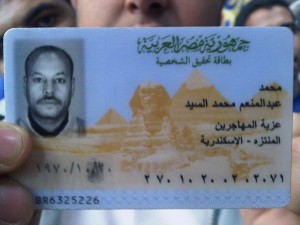
(Wikimedia Commons/Gamal El-Shayal)
By Lamia Nabil
The Ministry of State for Administrative Development (MSAD) will be launching a new online payment system for traffic violation fines “within a week”, said Ahmed Kamal Shaaban, head of the Government Services Development Programme at MSAD.
“This system will help relieve traffic congestion and facilitate payment procedures,” he said.
He added that the clearance certificate, which is issued once all fines are paid and allows the person to renew their driving licence, will be sent by post.
A source within MSAD also said that the ministry will be supporting the Ministry of Interior (MOI) in launching a new ID card format. ID cards issued from Wednesday 10 April 2013 onwards will now include a chip storing personal information, similar to chips in mobile SIM cards, “in order to prevent identity fraud”. The new cards will also include an image of the holder’s fingerprint, blood type and a personalised electronic signature.
MSAD currently has contracts with global IT and software giants IBM and Microsoft to digitise government portals and stored information. The source confirmed that these contracts remain valid and that “the government is still committed to these contracts for the sake of public service”.
Shaaban revealed that MSAD plans to launch a number of other new services in the coming period, including a range of electronic government services via the internet or mobile networks, as well as call centres to provide technical support for some 200 online services. MSAD will also introduce a “one-stop” service which will allow citizens visiting government authorities to finish official paperwork “via one window and one government employee” rather than the usual process which requires them to visit a number of offices in different locations in order to finish paperwork at government authority buildings.
Detailing the range of bodies and services with which MSAD cooperates, Shaaban added: “We cooperate with the Ministry of Justice and local authorities, the MOI, the Ministry of Communications and Information Technology, universities, and hospitals, and we also participate in providing information to voters during the election process.”
Regarding the last point, he added that the MSAD “supports the electronic voting process” and that it is more cost-efficient than regular voting.
“The most important thing here, however, is that we need new legislative amendments increasing citizens’ confidence in such technologies,” he added. “We also need to promote awareness of this technology and educate voters on how to use it, as well as determining the full judicial supervision for the process.”
According to a press release, MSAD also launched on Monday a new digital mechanism for the Al-Manial Specialised University Hospital, which is one of the Cairo University teaching hospitals, to facilitate operations at the hospital at the hospital management, employee and patient levels.
The project comprises digitising patient records, allocating a special number for each patient in order to ensure date accuracy and quick identification. It will also digitise drug stocks at the hospital, and will provide integrated medical services relying on the hospital’s information systems.
The hospital contains 300 beds, 9 operating rooms, and 1,540 workers and staff. The technology will be important in helping to avoid registry errors and accurately retrieving patient data.
The system will be coordinated with other similar systems at other Cairo University teaching hospitals to ensure sure any changes in patient records are coordinated between hospitals.
This coordinated system will also enable the Ministry of Higher Education to make logistical decisions regarding building, reports and statistics at all Cairo University teaching hospitals.
The project will be implemented through the processing and completion of the electronic infrastructure for the information network linking the hospitals, through developing 210 network points within the coordinated hospital system in order to link all hospitals’ information centres together.
According to MSAD’s website, the Ministry’s main objectives are “to develop the state’s administrative body so that it functions effectively and efficiently, to enable it to adapt to the fast pace of change, to improve the management of state resources, and to provide quality services to citizens”.
According to MSAD official statements, Information and Communication Technology (ICT) as a strategic tool that could be used in implementing the National Development Programme, which seeks to raise the efficiency of the state’s administrative body and to deliver governmental services at a fast pace. It aims to deliver government services to citizens through various interactive service channels.
As recently stated by MSAD on their website, what they term “the electronic government” provides services to around 4.5 million users in Egypt, which currently amounts to only 6% of the citizens in Egypt.
MSAD implements a number of programmes to achieve these goals, such as the National Databases Programme, aiming to link the National ID Database with other family and business-related databases.
Other programmes include the Institutional Development Programme which aims to develop plans, policies, laws and modern management structures. The programme also works to adjust government salary and incentive programmes through digitising the payroll systems.
Another MSAD initiative, the Enterprise Resource (ERP) programme, develops government work processes, reduces spending and automates public and governmental entities through the use of IT.



